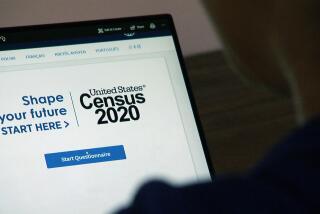New Minority Census Guidelines Scored
- Share via
WASHINGTON — Responding to concerns that minorities will be undercounted in the 1990 census, the Department of Commerce on Monday issued a set of streamlined guidelines to be used next year for determining whether a special count of blacks, Latinos and other groups would be incorporated as a part of the Census Bureau’s final figures.
Michael R. Darby, undersecretary of commerce, said the department made “substantial revisions” to the guidelines first proposed for making adjustments in the census. He claimed the new guidelines would “ensure the 1990 census is the most accurate population count that can be practically produced.”
However, attorneys for Los Angeles and New York City quickly labeled the new guidelines “a disgrace” and threatened another round of court battles to force the department to scrap them.
Los Angeles and New York filed a lawsuit last year to force the Census Bureau to take extra steps to count minorities, who typically have been undercounted. A July, 1989, settlement of the suit requires the bureau to conduct a random survey of 150,000 minority households--historically harder to find using normal methods--after completing the traditional mail census on April 1.
Representatives of the two cities had also attacked an earlier round of guidelines, proposed last December, that outlined the circumstances under which the random survey would be used. Their protests helped prompt the Census Bureau’s revisions.
But lead attorneys involved in the suit complained the new guidelines still give the commerce secretary too much discretion to reject the post-census survey, even if it produces a more accurate count of the nation’s population. Los Angeles city attorneys said they would issue a statement today about the department’s announcement, but declined comment until they more closely studied the guidelines.
Peter L. Zimroth, senior partner with the New York office of Arnold & Porter, and special counsel to the cities involved in the lawsuit, said the revised guidelines are an effort by the Bush Administration to use the census for political purposes.
“These guidelines are a disgrace,” he said. “They’re every bit as bad as the old proposals.”
In particular, Zimroth criticized the revised proposal that allows the secretary to “take into account the potential disruption” of the revised count on congressional redistricting. “By doing that,” he charged, “they have signaled their willingness to make the census a political act.”
Critics also complained about another provision in the new guidelines allowing the secretary to reject the post-census survey results “if sufficient data and analysis of the data are not available in time to publish adjusted counts by July 15, 1991.”
Department officials have said they would not make a decision on whether to use the minority household surveys before that date, and have expressed doubts they could be finished in time for the April 1, 1991, deadline for releasing data to the states for apportionment and redistricting purposes.
Larry Rolnick, an attorney with Cravath, Swaine & Moore, co-counsel for the cities, said the secretary’s responsibilities should extend no further than ensuring the census is conducted in the most accurate way possible.
“If an adjusted count is more accurate, how can he say it shouldn’t be used?” he asked. “One would not assume the secretary of commerce has the power to decide which count he wants to use, especially if he knows one of them is inaccurate.”
Rolnick said attorneys representing the cities would have to huddle before deciding how to respond to the department’s announcement. But he hinted they are likely to return to court.
More to Read
Get the L.A. Times Politics newsletter
Deeply reported insights into legislation, politics and policy from Sacramento, Washington and beyond. In your inbox twice per week.
You may occasionally receive promotional content from the Los Angeles Times.









